高中英语省略句及练习
高中英语状语从句省略现象练习题20题含答案解析

高中英语状语从句省略现象练习题20题含答案解析1. When _____, the museum is very beautiful.A. lighting upB. lit upC. is lit upD. being lit up答案解析:B。
选项A 应该是被动形式,所以错误。
选项C 多了“is”,不能省略主语和be 动词同时出现。
选项D“being lit up”强调正在被点亮的过程,不符合题意。
选项B“lit up”是过去分词表被动,相当于when it is lit up 的省略形式,符合状语从句省略规则,当主从句主语一致且从句中有be 动词时,可以省略主语和be 动词。
2. If ____ in time, we can finish the task.A. working hardB. we work hardC. worked hardD. to work hard答案解析:A。
选项B 不是省略形式。
选项C 少了“we are”,结构不完整。
选项D“to work hard”表目的,不是省略形式。
选项A“working hard”是现在分词短语,相当于if we are working hard 的省略形式,符合规则。
3. While ____ homework, he heard a loud noise.A. doingB. he doingC. didD. was doing答案解析:A。
选项B 错误,多了“he”。
选项C 和D 不是省略形式。
选项A“doing”是现在分词,相当于while he is doing homework 的省略形式。
4. When ____ to answer the question, he remained silent.A. askedB. askingC. he askedD. was asked答案解析:A。
选项B 应该是被动形式。
选项C 多了“he”。
高中英语省略句用法详解及练习
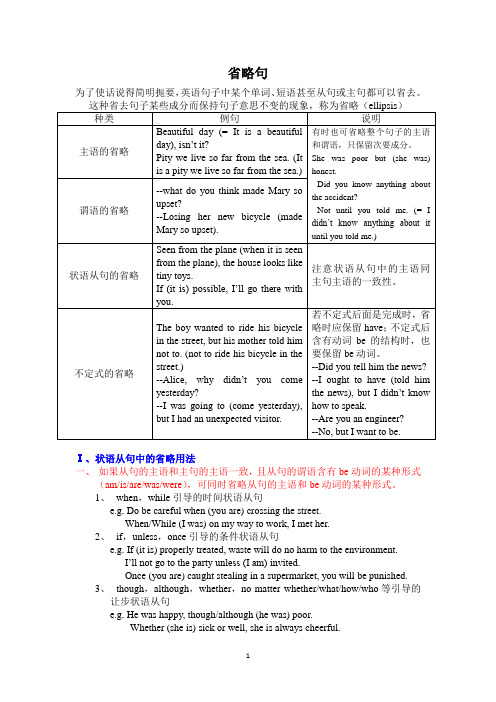
省略句为了使话说得简明扼要,英语句子中某个单词、短语甚至从句或主句都可以省去。
Ⅰ、状语从句中的省略用法一、如果从句的主语和主句的主语一致,且从句的谓语含有be动词的某种形式(am/is/are/was/were),可同时省略从句的主语和be动词的某种形式。
1、when,while引导的时间状语从句e.g. Do be careful when (you are) crossing the street.When/While (I was) on my way to work, I met her.2、if,unless,once引导的条件状语从句e.g. If (it is) properly treated, waste will do no harm to the environment.I’ll not go to the party unless (I am) invited.Once (you are) caught stealing in a supermarket, you will be punished.3、though,although,whether,no matter whether/what/how/who等引导的让步状语从句e.g. He was happy, though/although (he was) poor.Whether (she is) sick or well, she is always cheerful.No matter how/However hard the task (is), we must fulfill it in time.(注:从句的主语和主句的主语不一致时,只省略从句中的be动词形式)4、as if,as though引导的方式状语从句e.g. He rubbed his eyes and yawned as if/though (he was) waking up after along sleep.He stood up as if/though (he wanted) to leave.(as if/though + to do表示一个将来的动作)二、than,as引导的比较状语从句中的省略用法:当不同的主语进行比较时,一般省略从句中的谓语;当从句中的主语与谓语(be动词除外)和主句中的主语与谓语相同时,通常省略从句中的主语和谓语,只保留比较部分。
高三英语状语从句省略用法练习题40题答案解析版
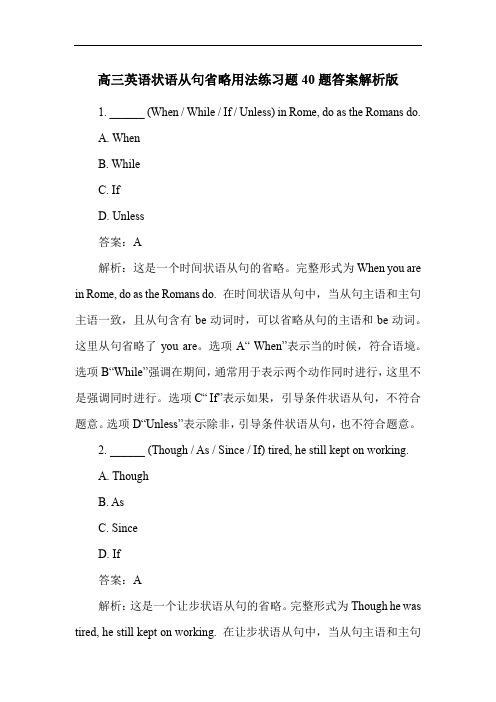
高三英语状语从句省略用法练习题40题答案解析版1. ______ (When / While / If / Unless) in Rome, do as the Romans do.A. WhenB. WhileC. IfD. Unless答案:A解析:这是一个时间状语从句的省略。
完整形式为When you are in Rome, do as the Romans do. 在时间状语从句中,当从句主语和主句主语一致,且从句含有be动词时,可以省略从句的主语和be动词。
这里从句省略了you are。
选项A“ When”表示当的时候,符合语境。
选项B“While”强调在期间,通常用于表示两个动作同时进行,这里不是强调同时进行。
选项C“ If”表示如果,引导条件状语从句,不符合题意。
选项D“Unless”表示除非,引导条件状语从句,也不符合题意。
2. ______ (Though / As / Since / If) tired, he still kept on working.A. ThoughB. AsC. SinceD. If答案:A解析:这是一个让步状语从句的省略。
完整形式为Though he was tired, he still kept on working. 在让步状语从句中,当从句主语和主句主语一致,且从句含有be动词时,可以省略从句的主语和be动词。
这里省略了he was。
选项A“Though”表示虽然,符合让步的语境。
选项B“As”引导让步状语从句时,句子需要倒装,这里形式不对。
选项C“Since”表示既然,引导原因状语从句,不符合题意。
选项D“ If”表示如果,引导条件状语从句,不符合题意。
3. The man will be sent to prison ______ (if / when / as / unless) found guilty.A. ifB. whenC. asD. unless答案:A解析:这是一个条件状语从句的省略。
高三英语状语从句省略用法练习题30题含答案解析
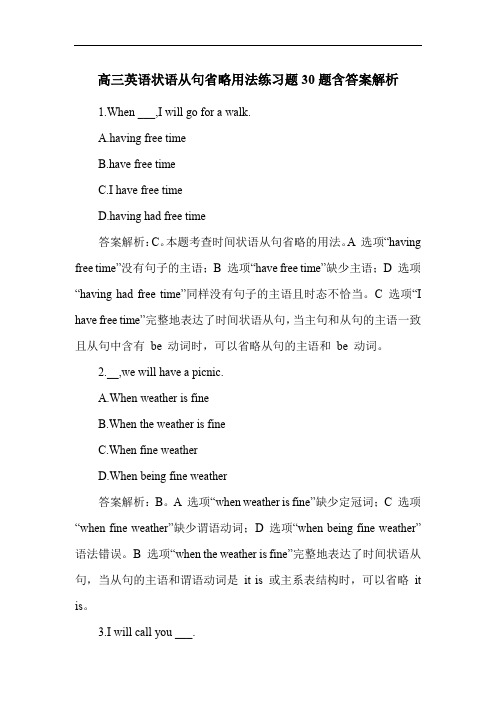
高三英语状语从句省略用法练习题30题含答案解析1.When ___,I will go for a walk.A.having free timeB.have free timeC.I have free timeD.having had free time答案解析:C。
本题考查时间状语从句省略的用法。
A 选项“having free time”没有句子的主语;B 选项“have free time”缺少主语;D 选项“having had free time”同样没有句子的主语且时态不恰当。
C 选项“I have free time”完整地表达了时间状语从句,当主句和从句的主语一致且从句中含有be 动词时,可以省略从句的主语和be 动词。
2.__,we will have a picnic.A.When weather is fineB.When the weather is fineC.When fine weatherD.When being fine weather答案解析:B。
A 选项“when weather is fine”缺少定冠词;C 选项“when fine weather”缺少谓语动词;D 选项“when being fine weather”语法错误。
B 选项“when the weather is fine”完整地表达了时间状语从句,当从句的主语和谓语动词是it is 或主系表结构时,可以省略it is。
3.I will call you ___.A.when I will arriveB.when arrivingC.when I arrivingD.when arrive答案解析:B。
A 选项“when I will arrive”时态不恰当;C 选项“when I arriving”语法错误;D 选项“when arrive”缺少主语。
B 选项“when arriving”省略了主语和be 动词,当主句和从句的主语一致且从句中含有be 动词时,可以省略从句的主语和be 动词。
高中英语省略句专练
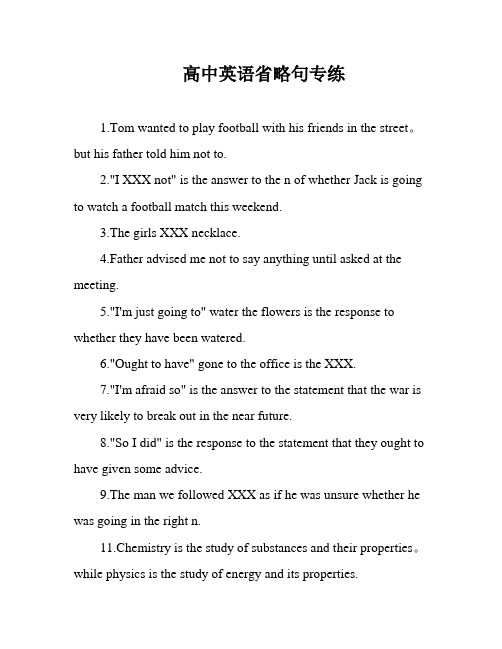
高中英语省略句专练1.Tom wanted to play football with his friends in the street。
but his father told him not to.2."I XXX not" is the answer to the n of whether Jack is going to watch a football match this weekend.3.The girls XXX necklace.4.Father advised me not to say anything until asked at the meeting.5."I'm just going to" water the flowers is the response to whether they have been watered.6."Ought to have" gone to the office is the XXX.7."I'm afraid so" is the answer to the statement that the war is very likely to break out in the near future.8."So I did" is the response to the statement that they ought to have given some advice.9.The man we followed XXX as if he was unsure whether he was going in the right n.11.Chemistry is the study of substances and their properties。
高中英语状语从句省略现象练习题20题(带答案)

高中英语状语从句省略现象练习题20题(带答案)1. When ____ in the park, he met his old friend.A. walkedB. walkingC. he walkingD. he walked答案解析:B。
在时间状语从句中,当从句的主语和主句的主语一致,且从句中含有be动词时,可以把从句的主语和be动词省略。
原句完整形式为When he was walking in the park, he met his old friend。
A选项walked形式错误;C选项he walking结构错误;D选项没有省略,不符合状语从句省略规则。
2. While ____ to school, she saw a car accident.A. she was goingB. goingC. wentD. she going答案解析:B。
这里是while引导的时间状语从句的省略情况,完整形式是While she was going to school, she saw a car accident。
从句主语she和主句主语she一致,且从句有be动词was,可省略she was。
A选项没有省略;C选项went形式错误;D选项she going结构错误。
3. If ____ carefully, you can find the difference.A. lookB. lookingC. you lookingD. you look答案解析:B。
这是if引导的条件状语从句的省略,完整为If you are looking carefully, you can find the difference。
当从句主语和主句主语一致(这里都是you),从句有be动词(are)时,可省略you are。
A选项缺少主语;C选项you looking结构错误;D选项没有省略。
4. Once ____, the book will be very popular.A. publishB. publishedC. it publishedD. it is published答案解析:B。
人教版高考英语省略句练习题50题含答案解析
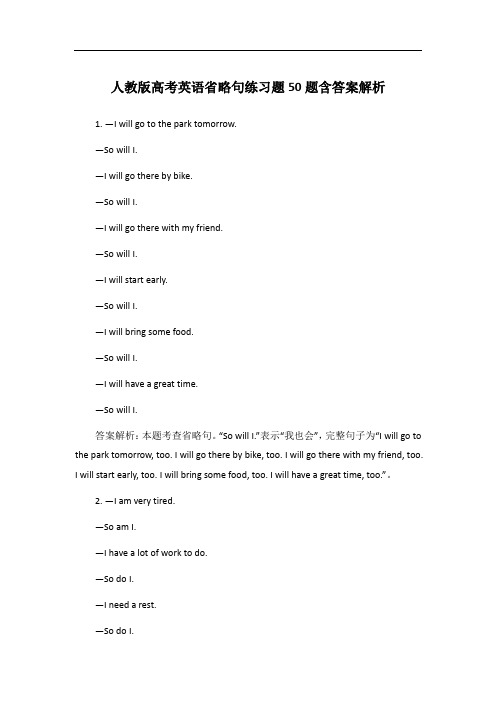
人教版高考英语省略句练习题50题含答案解析1. —I will go to the park tomorrow.—So will I.—I will go there by bike.—So will I.—I will go there with my friend.—So will I.—I will start early.—So will I.—I will bring some food.—So will I.—I will have a great time.—So will I.答案解析:本题考查省略句。
“So will I.”表示“我也会”,完整句子为“I will go to the park tomorrow, too. I will go there by bike, too. I will go there with my friend, too.I will start early, too. I will bring some food, too. I will have a great time, too.”。
2. —I am very tired.—So am I.—I have a lot of work to do.—So do I.—I need a rest.—So do I.—I want to go home.—So do I.—I don't like this weather.—Neither do I.—I can't wait for the weekend.—Neither can I.答案解析:本题考查省略句。
“So am I.”表示“我也是”,用于肯定句中,“Neither do I.”和“Neither can I.”表示“我也不是”,用于否定句中。
3. —I like apples.—So do I.—I like bananas.—So do I.—I like oranges.—So do I.—I don't like grapes.—Neither do I.—I don't like watermelons.—Neither do I.—I don't like strawberries.—Neither do I.答案解析:本题考查省略句。
高一英语省略句练习题40题(答案解析)

高一英语省略句练习题40题(答案解析)1.When in trouble, she always turns to her teacher for help.A.in troubleB.turns toC.for helpD.no option答案解析:A 选项“in trouble”是省略句,完整形式是“When she is in trouble”,在时间、条件、让步等状语从句中,当从句的主语和主句的主语一致,且谓语动词含有be 动词时,可以省略从句的主语和be 动词。
2.If possible, I will come to see you tomorrow.A.possiblee toC.see youD.no option答案解析:A 选项“possible”是省略句,完整形式是“If it is possible”,同理,在条件状语从句中省略了主语和be 动词。
3.Though tired, he still went on working.A.tiredB.went onC.workingD.no option答案解析:A 选项“tired”是省略句,完整形式是“Though he was tired”,在让步状语从句中可以这样省略。
4.While waiting for the bus, I read a book.A.waiting forB.read a bookC.the busD.no option答案解析:A 选项“waiting for”是省略句,完整形式是“While I was waiting for the bus”,在时间状语从句中省略了主语和be 动词。
5.When asked about his hobby, he said he liked reading.A.asked aboutB.saidC.liked readingD.no option答案解析:A 选项“asked about”是省略句,完整形式是“When he was asked about his hobby”,在时间状语从句中省略了主语和be 动词。
高一英语省略句练习题40题带答案解析
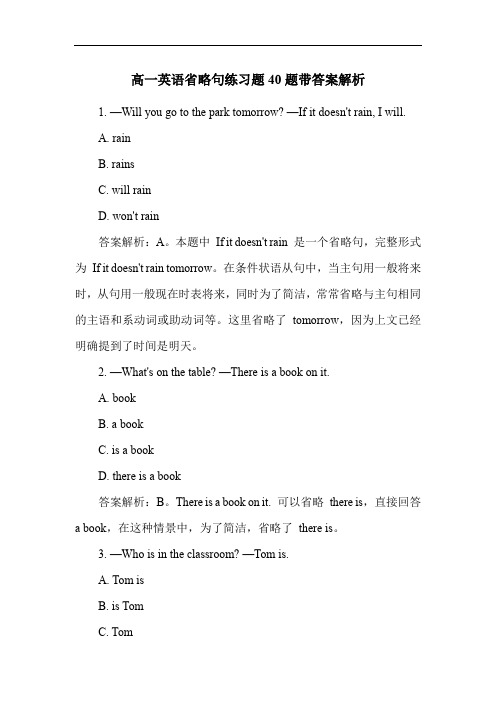
高一英语省略句练习题40题带答案解析1. —Will you go to the park tomorrow? —If it doesn't rain, I will.A. rainB. rainsC. will rainD. won't rain答案解析:A。
本题中If it doesn't rain 是一个省略句,完整形式为If it doesn't rain tomorrow。
在条件状语从句中,当主句用一般将来时,从句用一般现在时表将来,同时为了简洁,常常省略与主句相同的主语和系动词或助动词等。
这里省略了tomorrow,因为上文已经明确提到了时间是明天。
2. —What's on the table? —There is a book on it.A. bookB. a bookC. is a bookD. there is a book答案解析:B。
There is a book on it. 可以省略there is,直接回答a book,在这种情景中,为了简洁,省略了there is。
3. —Who is in the classroom? —Tom is.A. Tom isB. is TomC. TomD. there is Tom答案解析:A。
完整回答是Tom is in the classroom. 为了简洁,省略了in the classroom。
4. —Where is your pen? —It's in my bag.A. in my bagB. is in my bagC. it's in my bagD. there is in my bag答案解析:B。
完整回答是It is in my bag. 省略了主语it 和系动词is 之间的空格,为了更加简洁地表达。
5. —How are you? —Fine, thank you.A. FineB. I am fineC. am fineD. Fine, I am答案解析:B。
高中英语状语从句省略现象练习题20题带答案解析
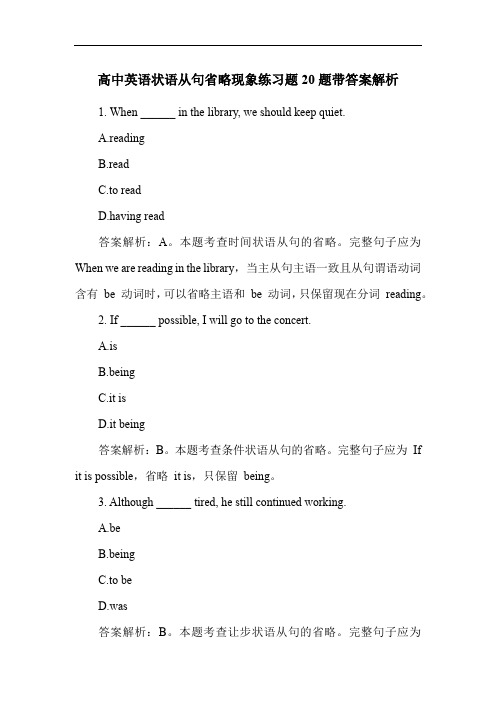
高中英语状语从句省略现象练习题20题带答案解析1. When ______ in the library, we should keep quiet.A.readingB.readC.to readD.having read答案解析:A。
本题考查时间状语从句的省略。
完整句子应为When we are reading in the library,当主从句主语一致且从句谓语动词含有be 动词时,可以省略主语和be 动词,只保留现在分词reading。
2. If ______ possible, I will go to the concert.A.isB.beingC.it isD.it being答案解析:B。
本题考查条件状语从句的省略。
完整句子应为If it is possible,省略it is,只保留being。
3. Although ______ tired, he still continued working.A.beB.beingC.to beD.was答案解析:B。
本题考查让步状语从句的省略。
完整句子应为Although he is tired,省略he is,只保留being。
4. When ______ to answer the question, he remained silent.A.askedB.askingC.to askD.having asked答案解析:A。
时间状语从句省略,完整句子为When he was asked to answer the question,省略he was,只保留asked。
5. If ______ carefully, the experiment will succeed.A.doB.doneC.doingD.to do答案解析:B。
条件状语从句省略,完整句子为If it is done carefully,省略it is,只保留done。
高三英语状语从句省略用法练习题40题含答案解析
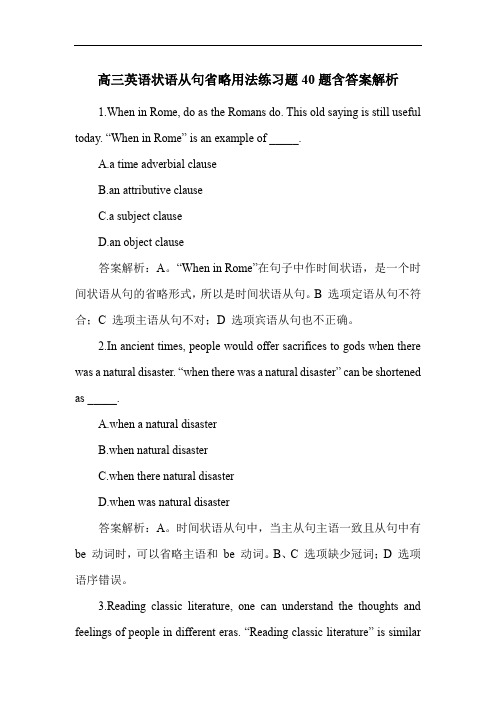
2022年苏教版一年级数学(下册)期末质量检测卷及答案(时间:60分钟分数:100分)班级:姓名:分数:一、计算小能手(20分)1、直接写出得数。
21-9=30+70= 60+20= 40-7-8=28+4= 63-30= 95-90= 12+50-4=6+34= 20+47= 66-4= 100-30-20=13-5= 50-3= 3+21= 15-9+6=74-4= 47+5= 13-7= 16+7+20=二、填空题。
(共20分)1、9比6大(),3比7小().2、与80相邻的两个数是()和()。
3、在50、99、64、18中选数填空。
()比55大得多,()比55大一些。
()比64小得多,()最接近49。
4、哥哥和弟弟下棋,哥哥下了3盘,弟弟也下了3盘,他们一共下了()盘.5、个位上是2,十位上是1的数是().6、最大的两位数与最小的两位数相差().7、48比30多(),25比42少().8、一共有()个人在排队买票,排在第(),排在第().9、图中有10名登山运动员齐步向前走,队长排在第8位。
教练员发令“向后转”后,队长排在第()位。
10、用20元钱,正好可以买()辆玩具汽车,也正好可以买()条裙子,最多可以买()顶帽子。
三、我会选。
(10分)1、钟面上时针和分针成直角时,这时的时间是().A.2时B.3时或9时C.6时2、下面各数中,与90最接近的是().A.86 B.89 C.923、小胖站在阳台上,面对南面,那么他的右手一边是()A.北面B.西面C.南面D.东面4、与78最接近的一个整十数是()。
A.80 B.70 C.605、下面少得是().A.B.四、数一数,填一填。
(10分)1、.(1)上面的方框里共有(______)个长方形、(______)个正方形、(______)个三角形、(______)个圆。
(2)(______)形的个数最多,(______)形的个数最少。
五、看图列式计算。
高一英语省略句练习题40题含答案解析

高一英语省略句练习题40题含答案解析1. —Do you like apples? —Yes, I do. / No, I don't.答案解析:这是简单句中的省略回答。
省略了主语和谓语动词后的宾语“apples”。
语法规则是在简单句的回答中,可以省略与问句中重复的部分。
2. —Is she a teacher? —Yes, she is. / No, she isn't.答案解析:省略了主语和谓语动词后的表语“a teacher”。
语法规则同上。
3. —Can you swim? —Yes, I can. / No, I can't.答案解析:省略了主语和谓语动词后的宾语( 无具体宾语,省略了动作对象)。
语法规则同上。
4. —Have you seen the movie? —Yes, I have. / No, I haven't.答案解析:省略了主语和谓语动词后的宾语“the movie”。
语法规则同上。
5. —Does he like music? —Yes, he does. / No, he doesn't.答案解析:省略了主语和谓语动词后的宾语“music”。
语法规则同上。
6. —Are you happy? —Yes, I am. / No, I'm not.答案解析:省略了主语和谓语动词后的表语“happy”。
语法规则同上。
7. —Should we go now? —Yes, we should. / No, we shouldn't.答案解析:省略了主语和谓语动词后的宾语( 无具体宾语,省略了动作对象)。
语法规则同上。
8. —Must I finish the work today? —Yes, you must. / No, you needn't.答案解析:省略了主语和谓语动词后的宾语“the work”和时间状语“today”。
高一英语省略句练习题40题带答案
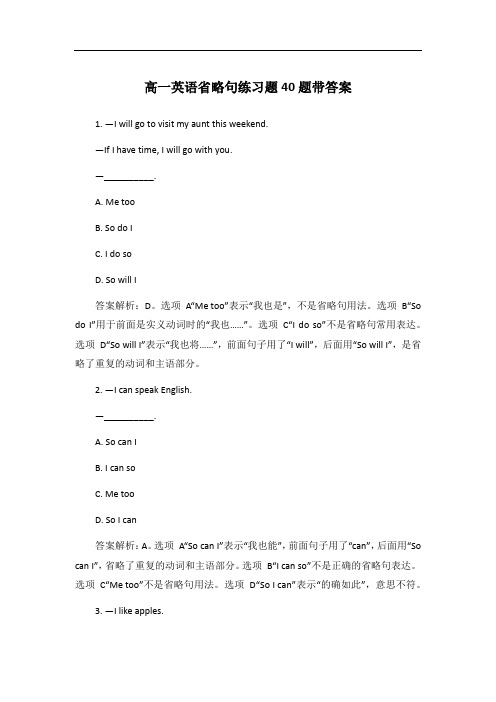
高一英语省略句练习题40题带答案1. —I will go to visit my aunt this weekend.—If I have time, I will go with you.—__________.A. Me tooB. So do IC. I do soD. So will I答案解析:D。
选项A“Me too”表示“我也是”,不是省略句用法。
选项B“So do I”用于前面是实义动词时的“我也……”。
选项C“I do so”不是省略句常用表达。
选项D“So will I”表示“我也将……”,前面句子用了“I will”,后面用“So will I”,是省略了重复的动词和主语部分。
2. —I can speak English.—__________.A. So can IB. I can soC. Me tooD. So I can答案解析:A。
选项A“So can I”表示“我也能”,前面句子用了“can”,后面用“So can I”,省略了重复的动词和主语部分。
选项B“I can so”不是正确的省略句表达。
选项C“Me too”不是省略句用法。
选项D“So I can”表示“的确如此”,意思不符。
3. —I like apples.—__________.A. So do IB. I do soC. Me tooD. So I do答案解析:A。
选项A“So do I”表示“我也……”,前面句子用了“like”,后面用“So do I”,省略了重复的动词和主语部分。
选项B“I do so”不是常用省略句表达。
选项C“Me too”不是省略句用法。
选项D“So I do”表示“的确如此”,意思不符。
4. —I am a student.—__________.A. So am IB. I am soC. Me tooD. So I am答案解析:A。
选项A“So am I”表示“我也是”,前面句子用了“am”,后面用“So am I”,省略了重复的动词和主语部分。
高一英语省略句运用实例练习题30题
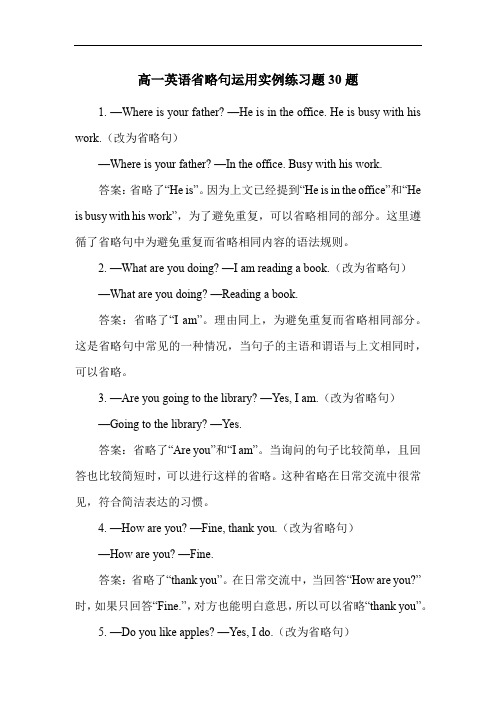
高一英语省略句运用实例练习题30题1. —Where is your father? —He is in the office. He is busy with his work.(改为省略句)—Where is your father? —In the office. Busy with his work.答案:省略了“He is”。
因为上文已经提到“He is in the office”和“He is busy with his work”,为了避免重复,可以省略相同的部分。
这里遵循了省略句中为避免重复而省略相同内容的语法规则。
2. —What are you doing? —I am reading a book.(改为省略句)—What are you doing? —Reading a book.答案:省略了“I am”。
理由同上,为避免重复而省略相同部分。
这是省略句中常见的一种情况,当句子的主语和谓语与上文相同时,可以省略。
3. —Are you going to the library? —Yes, I am.(改为省略句)—Going to the library? —Yes.答案:省略了“Are you”和“I am”。
当询问的句子比较简单,且回答也比较简短时,可以进行这样的省略。
这种省略在日常交流中很常见,符合简洁表达的习惯。
4. —How are you? —Fine, thank you.(改为省略句)—How are you? —Fine.答案:省略了“thank you”。
在日常交流中,当回答“How are you?”时,如果只回答“Fine.”,对方也能明白意思,所以可以省略“thank you”。
5. —Do you like apples? —Yes, I do.(改为省略句)—Like apples? —Yes.答案:省略了“Do you”和“I do”。
高一英语省略句练习题40题(答案解析)

高一英语省略句练习题40题(答案解析)1.When necessary, I will help you.A.When I am necessaryB.When it is necessaryC.When is necessaryD.When are necessary答案解析:B。
这句话省略了主语和be 动词。
完整的句子是“When it is necessary, I will help you.”,这里的“it”指代后面的事情,在从句中可以省略主语和be 动词。
2.If possible, he will come to see us.A.If he is possibleB.If it is possibleC.If is possibleD.If are possible答案解析:B。
省略了主语和be 动词。
完整句子是“If it is possible, he will come to see us.”,“it”在这里指代后面的事情,在从句中可省略主语和be 动词。
3.While studying, he listens to music.A.While he is studyingB.While is studyingC.While are studyingD.While they are studying答案解析:A。
省略了主语和be 动词。
完整句子是“While he is studying, he listens to music.”,主语是“he”,在从句中可省略主语和be 动词。
4.When in trouble, ask for help.A.When you are in troubleB.When he is in troubleC.When she is in troubleD.When it is in trouble答案解析:A。
省略了主语和be 动词。
完整句子是“When you are in trouble, ask for help.”,这里默认是“你”在困境中,在从句中可省略主语和be 动词。
高一英语省略句练习题40题【含答案解析】
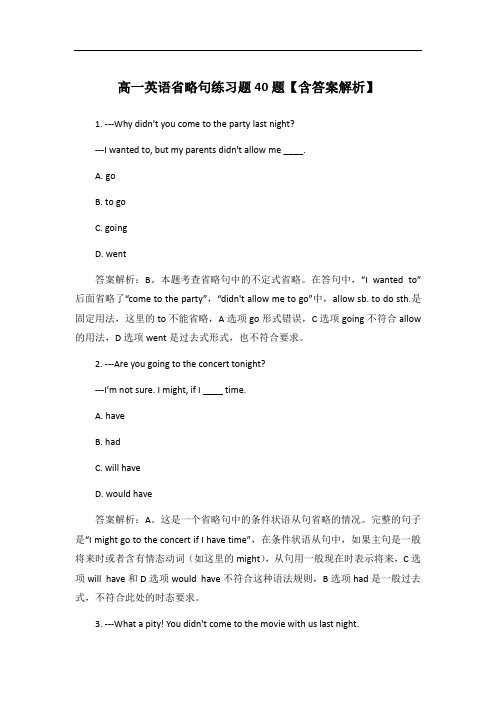
高一英语省略句练习题40题【含答案解析】1. ---Why didn't you come to the party last night?---I wanted to, but my parents didn't allow me ____.A. goB. to goC. goingD. went答案解析:B。
本题考查省略句中的不定式省略。
在答句中,“I wanted to”后面省略了“come to the party”,“didn't allow me to go”中,allow sb. to do sth.是固定用法,这里的to不能省略,A选项go形式错误,C选项going不符合allow 的用法,D选项went是过去式形式,也不符合要求。
2. ---Are you going to the concert tonight?---I'm not sure. I might, if I ____ time.A. haveB. hadC. will haveD. would have答案解析:A。
这是一个省略句中的条件状语从句省略的情况。
完整的句子是“I might go to the concert if I have time”,在条件状语从句中,如果主句是一般将来时或者含有情态动词(如这里的might),从句用一般现在时表示将来,C选项will have和D选项would have不符合这种语法规则,B选项had是一般过去式,不符合此处的时态要求。
3. ---What a pity! You didn't come to the movie with us last night.---I really wanted to, but I ____ for my English test.A. studiedB. was studyingC. had studiedD. would study答案解析:B。
高中英语状语从句省略现象练习题20题含答案解析
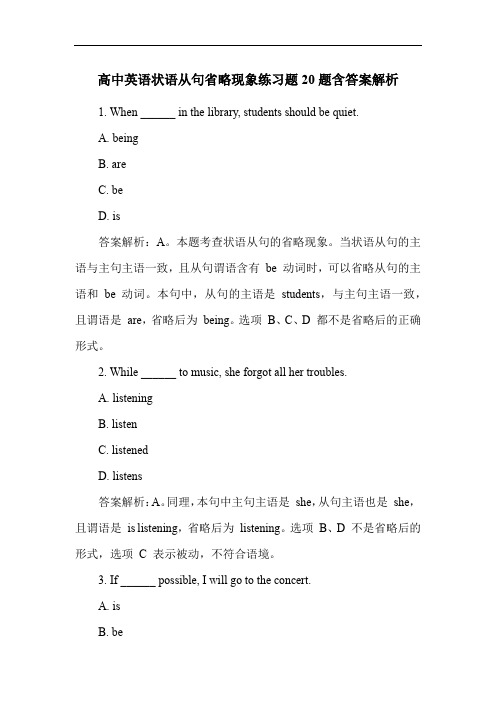
高中英语状语从句省略现象练习题20题含答案解析1. When ______ in the library, students should be quiet.A. beingB. areC. beD. is答案解析:A。
本题考查状语从句的省略现象。
当状语从句的主语与主句主语一致,且从句谓语含有be 动词时,可以省略从句的主语和be 动词。
本句中,从句的主语是students,与主句主语一致,且谓语是are,省略后为being。
选项B、C、D 都不是省略后的正确形式。
2. While ______ to music, she forgot all her troubles.A. listeningB. listenC. listenedD. listens答案解析:A。
同理,本句中主句主语是she,从句主语也是she,且谓语是is listening,省略后为listening。
选项B、D 不是省略后的形式,选项C 表示被动,不符合语境。
3. If ______ possible, I will go to the concert.A. isB. beC. amD. it is答案解析:D。
本题中if 引导的条件状语从句,完整形式是If it is possible,这里不能省略主语和be 动词,因为主语不是和主句主语一致。
选项A、B、C 都是错误的。
4. Once ______ at the party, she had a great time.A. beingB. isC. wasD. be答案解析:A。
理由同第一题,主句主语是she,从句主语也是she,且谓语是is,省略后为being。
选项B、C、D 错误。
5. Though ______ tired, he still finished his work.A. beB. beingC. isD. are答案解析:B。
与前面的题目类似,主句主语是he,从句主语也是he,且谓语是is tired,省略后为being。
高考英语省略句单选题30题
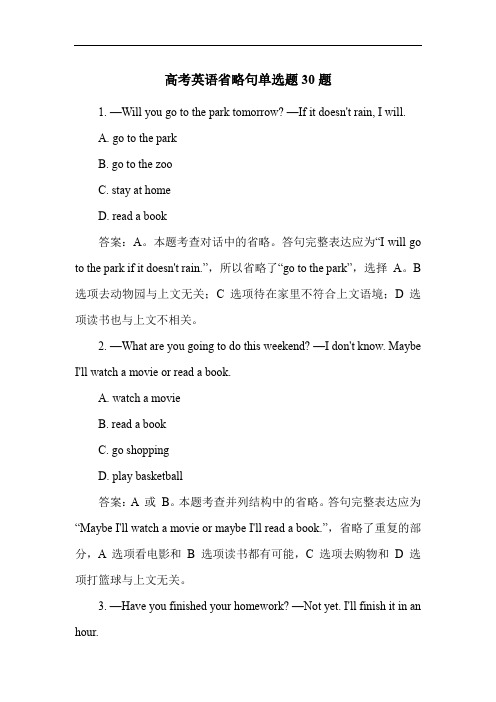
高考英语省略句单选题30题1. —Will you go to the park tomorrow? —If it doesn't rain, I will.A. go to the parkB. go to the zooC. stay at homeD. read a book答案:A。
本题考查对话中的省略。
答句完整表达应为“I will go to the park if it doesn't rain.”,所以省略了“go to the park”,选择A。
B 选项去动物园与上文无关;C 选项待在家里不符合上文语境;D 选项读书也与上文不相关。
2. —What are you going to do this weekend? —I don't know. Maybe I'll watch a movie or read a book.A. watch a movieB. read a bookC. go shoppingD. play basketball答案:A 或B。
本题考查并列结构中的省略。
答句完整表达应为“Maybe I'll watch a movie or maybe I'll read a book.”,省略了重复的部分,A 选项看电影和B 选项读书都有可能,C 选项去购物和D 选项打篮球与上文无关。
3. —Have you finished your homework? —Not yet. I'll finish it in an hour.A. finish my homeworkB. do some houseworkC. go for a walkD. call my friend答案:A。
本题考查答语中的省略。
答句完整表达应为“I'll finish my homework in an hour.”,省略了“my homework”,选择A。
高一英语省略句练习题40题(带答案)
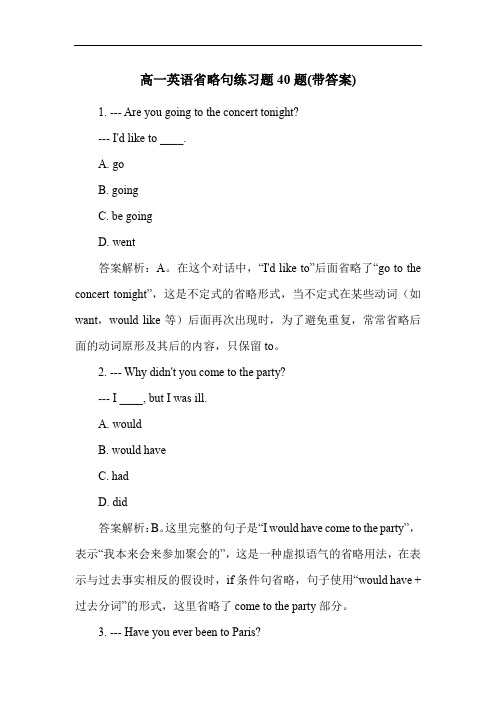
高一英语省略句练习题40题(带答案)1. --- Are you going to the concert tonight?--- I'd like to ____.A. goB. goingC. be goingD. went答案解析:A。
在这个对话中,“I'd like to”后面省略了“go to the concert tonight”,这是不定式的省略形式,当不定式在某些动词(如want,would like等)后面再次出现时,为了避免重复,常常省略后面的动词原形及其后的内容,只保留to。
2. --- Why didn't you come to the party?--- I ____, but I was ill.A. wouldB. would haveC. hadD. did答案解析:B。
这里完整的句子是“I would have come to the party”,表示“我本来会来参加聚会的”,这是一种虚拟语气的省略用法,在表示与过去事实相反的假设时,if条件句省略,句子使用“would have + 过去分词”的形式,这里省略了come to the party部分。
3. --- Have you ever been to Paris?--- No, but I hope ____.A. toB. soC. itD. that答案解析:A。
完整句子是“I hope to go to Paris”,这里省略了“go to Paris”,hope后面可以接不定式,在回答中为了避免重复,只保留了to。
4. --- What do you think made Mary so upset?--- ____ her new bike.A. As she lostB. LostC. LosingD. Because of losing答案解析:C。
完整句子是“Losing her new bike made Mary so upset”,这里使用动名词短语作主语,在回答中省略了谓语部分“made Mary so upset”,直接用动名词短语作答。
高一英语省略句运用练习题20题(答案解析)
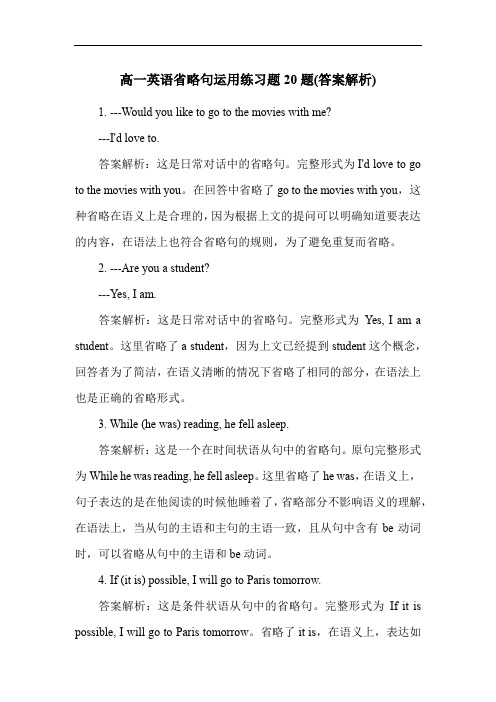
高一英语省略句运用练习题20题(答案解析)1. ---Would you like to go to the movies with me?---I'd love to.答案解析:这是日常对话中的省略句。
完整形式为I'd love to go to the movies with you。
在回答中省略了go to the movies with you,这种省略在语义上是合理的,因为根据上文的提问可以明确知道要表达的内容,在语法上也符合省略句的规则,为了避免重复而省略。
2. ---Are you a student?---Yes, I am.答案解析:这是日常对话中的省略句。
完整形式为Yes, I am a student。
这里省略了a student,因为上文已经提到student这个概念,回答者为了简洁,在语义清晰的情况下省略了相同的部分,在语法上也是正确的省略形式。
3. While (he was) reading, he fell asleep.答案解析:这是一个在时间状语从句中的省略句。
原句完整形式为While he was reading, he fell asleep。
这里省略了he was,在语义上,句子表达的是在他阅读的时候他睡着了,省略部分不影响语义的理解,在语法上,当从句的主语和主句的主语一致,且从句中含有be动词时,可以省略从句中的主语和be动词。
4. If (it is) possible, I will go to Paris tomorrow.答案解析:这是条件状语从句中的省略句。
完整形式为If it is possible, I will go to Paris tomorrow。
省略了it is,在语义上,表达如果可能的话我明天将去巴黎,省略部分不影响语义的传达,在语法上,当从句的主语是it,且含有be动词时,在条件状语从句中可以省略it is。
- 1、下载文档前请自行甄别文档内容的完整性,平台不提供额外的编辑、内容补充、找答案等附加服务。
- 2、"仅部分预览"的文档,不可在线预览部分如存在完整性等问题,可反馈申请退款(可完整预览的文档不适用该条件!)。
- 3、如文档侵犯您的权益,请联系客服反馈,我们会尽快为您处理(人工客服工作时间:9:00-18:30)。
高中英语省略句莎士比亚曾经说过:Brevity is the soul of wit. (言以简为贵)。
为了使话说得简明扼要,英语句子中某个单词、短语甚至从句或主句都可以省去。
这种省去句子某些成分而保持句子意思不变的现象,称为省略(ellipsis)。
一、省略的目的省略多见于非正式的文体,尤其在对话中,省略是一种十分普遍的现象。
英语中的省略一般说来有三个目的:A.避免重复,减少累赘。
省略的主要目的是避免重复,去掉不必要的累赘和繁琐。
Mike said that he would come to school to see me the next day, but he didn't come to school to see me the next day. 迈克说他第二天要来学校看我,但是第二天他并没有来学校看我。
-- Mike said that he would come to school to see me the next day, but he didn't. 迈克说他第二天要来学校看我,但是他并没有来。
(省掉最后九个词,句子简洁多了)— What did he want yesterday 他昨天要了什么?— An apple. 一个苹果。
(如果答复时说出全文“He wanted an apple yesterday”,便显得别扭,不自然)B.连接紧密,结构紧凑。
省略也是使上下文紧密连接的一种修辞手段。
John was the winner in 1994 and Bob in 2021. 约翰是1994年的获胜者,鲍勃是2021年的获胜者。
(Bob后省略了was the winner,句子结构显得比拟紧凑)In some places we stopped in tents for the night, in other places in caves. 我们在有些地方住在帐篷里过夜,在有些地方住在山洞里。
(in other places 后省略了主语和谓语we stopped for the night,上下文连接更加紧密)省略:答复问题要简洁,并列重复需省略。
祈使主语常省略,比拟than后需省略。
宾从表从that勿省略。
前后出现同一词,习惯表达需省略。
C.强调重点,突出信息。
省略的另一作用是突出新的信息。
Truth speaks too low, hypocrisy too loud. 真理讲话声太低,虚伪讲话声太高。
(后一分句省略谓语speaks,突出了too loud)— Have you told him that 你把那告诉他了吗?— Not yet. 还没有呢。
(= I have not told him that yet. 强调not yet )二、可省略的成分省略大致可归纳为功能词的省略和语法结构上的省略两种。
在很多情况下,这两种省略存在着交*的关系,即有时既是功能词的省略,同时又是语法结构上的省略。
A.功能词的省略功能词指的是没有完整意义,但有语法意义的词,如冠词、介词、助动词等。
英语句子结构的简洁,首先表现在功能词的省略上。
1.冠词的省略They elected John (the) monitor of the class. 他们选约翰当班长。
A man and (a) woman are talking in the office. 办公室一男一女正在谈话。
He could not understand why there was no noise coming from the house, not even the sound of the radio or (the) television. 他不明白为什么从屋子里一点响声也没传出来,甚至连收音机和电视机的声音也没有。
提示:在英语新闻标题、告示中,经常省略冠词。
Chinese President Stresses Role of Working Class 中国国家主席强调工人阶级作用(新闻标题= The Chinese President Stresses the Role of the Working Class)People Rebuild Homes After Flood 洪水退后人民重建家园(新闻标题= The People Rebuild Their Homes After the Flood)DO NOT SPEAK TO DRIVER WHILE BUS IS IN MOTION 汽车在行驶时请勿和司机讲话。
(告示= Do not speak to the driver while the bus is in motion)2.代词的省略I went to the market, (I) bought something useful, and (I) returned home within an hour. 我去了市场,买了点有用的东西,一小时之内就回来了。
They didn't like it, yet (they) said nothing. 他们并不喜欢它,可是什么话也没说。
(It) Doesn't matter. 这不碍事。
(You) Had a good time, didn't you 玩得开心,是吧?I like your two small bottles, but I don't like the smallest (one). 我喜欢你的两只小瓶子,但我不喜欢最小的那一只。
3.连词的省略We are delighted (that) you can come. 你能来,我们很高兴。
I believe (that) you will succeed.我相信你们会成功的。
It's a pity (that) he's leaving. 他要走,真遗憾。
4.关系词的省略I'll give you all (that) I have. 我要把我所有的一切都给你。
He read the book (which) I got yesterday. 他看过我昨天买的书了。
It wasn't I (who) let him in. 不是我放他进来的。
It happened on the day (when) we first met. 这发生在我们初次见面的那一天。
There is a man (who) wants to see you. 有个人想要见你。
5.助动词的省略(Does) Anyone want a drink 有谁要喝一杯吗?Who (do) you think you are 你以为你是谁?(在特殊疑问句中,当主语是第二人称时,助动词do可省略)I (have) got to go now. 我得走了。
6.不定式符号的省略I hope to finish my job and (to) go back home. 我希望做完事回家。
(当几个不定式并列时,一般只需在第一个不定式前用to)What we could do was (to) get away. (主语从句中含有do,那么作表语的动词不定式往往省略to)We did not dare (to) speak. 我们不敢说话。
(dare作行为动词用时,否定式可省略to)There is nothing to do but (to) obey the orders. 除了服从命令之外,我们别无他法。
(介词but前如有do,but后可省略to)注意:当两个并列的不定式在意义上表示对比关系时,后面的不定式一般不省略to。
To be or not to be, that is the question. 活着还是死亡,这就是问题所在。
(莎士比亚)It was better to laugh than to cry. 笑比哭好。
7.介词的省略He went (in) that way. 他往那边去了。
The two boys are (of) the same age. 这两个男孩年龄一样大。
I am in doubt (about) whether this is right or not. 我拿不定主意这对不对。
You may come to see me (at) any time between 4 and 5. 你在4点到5点之间随时都可以来见我。
She must have stayed here (for) a long time. 她在这里一定呆了很久了。
必背:在以下结构中,介词in常常省略。
be busy (in) doing sth. 忙于做某事spend time (in) doing sth. 花时间做某事waste energy (in) doing sth. 浪费精力做某事have difficulty (in) doing sth. 做某事有困难have a good time (in) doing sth. 某事做得非常愉快have a hard time (in) doing sth. 某事做得很艰难take turns (in) doing sth. 轮流做某事It is no use (in) doing sth. 做某事没有用It is no good (in) doing sth. 做某事无益There is no hurry (in) doing sth. 不必着急做某事There is no point (in) doing sth. 做某事无意义There is no use (in) doing sth. 做某事没有用8.引导词there的省略(There) Ought to be some coffee in the pot.壶里应该有些咖啡的。
(There) Must be somebody waiting for you. 肯定有人在等你。
B.句子成分的省略为了避免重复,或者为了使某一内容显要注目,可以省略某些句子成分而保持句子原意不变。
1.省略主语Hope so. 希望如此。
(= I hope so.)Beg your pardon. 请你原谅。
(= I beg your pardon.)Take care! 留神!(= You take care.)Looks as if it will rain. 看起来像要下雨。
(= It looks as if it will rain.)Serves you right. 你活该!(= It serves you right.)注意:祈使句主语通常省略(如Take care! 留神!)。
